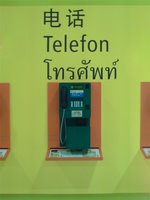Siong Leng Musical Association will be staging a Liyuan opera titled "Li Yaxian" at the Esplanade Recital Studio next month. This will be the association's first full-length Liyuan opera performance for over a decade.

The Liyuan opera has got the reputation of being Chinese opera's living heritage as it has got a long history of 800 years, and it was even said that the ways huadans in Liyuan opera moved and walked were actually inspired by how women really walked back in the Ming dynasty. The repertoire for Liyuan opera is also one of the rarest; some of the scripts dates back to the era of Song dynasty's "Zaju" opera and had already been extinct in other opera genres.
"Li Yaxian" is one of the most popular shows that are still being performed in Liyuan opera. It tells the story of a talented scholar, Zheng Yuanhe, who fell in love with a beautiful courtesan named Li Yaxian while on his way to sit for the imperial examinations. In order to get close to this beauty, Yuanhe decided to step into the "forbidden zone" - the brothel which Yaxian lived in. Brothel owner Madame Li knew this was a good opportunity to cheat Yuanhe of his money, so she decided to bring the couple together. After neglecting his studies and having used up all his money, the heartless Madame Li had Yuanhe chased out, and Yaxian used her own money to redeem herself to go in search of Yuanhe.
For Siong Leng's performance, however, there was a slight change to the script, for now, the love story of Zheng Yuanhe and Li Yaxian would be unfold through the camera lens of a modern-day photographer. That makes me curious over one point: this performance has been introduced as a "Liyuan opera", but is it going to be really a pure Liyuan opera, for it seems that there is a bit of contemporary drama essence involved. My guess is that it could be something like "Titoudao", a fusion of contemporary drama with authentic Chinese opera, just that in this case, the dosage of Liyuan opera would be much stronger, and lesser concentration on contemporary drama (maybe 10% or lesser). If that is the case, labelling this show as "Liyuan opera" might be a bit misleading, for those who is more into watching "authentic" Chinese opera. Nevertheless, I still feel that this show sounds interesting, and should be a good performance to catch.
"Li Yaxian" is part of the "Chinese opera delights" series by the Esplanade, and shall be staged on 11 August 2007, 3pm and 8pm, at the Esplanade Ricital Studio. Tickets are priced at $35 (senior citizens, NSF and students enjoy a concession price of $26), and is available at SISTIC.


